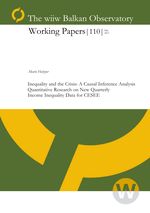Inequality and the Crisis: A Causal Inference Analysis
A new database for the calculation of quarterly income inequality measures was established for 11 economies from Central, East and Southeast Europe for the period of 1st quarter 2000 to 4th quarter 2011. Based on the large panel of the acquired quarterly Gini coefficients an ‘Acemoglu-style’ causal inference analysis on the impact of the global financial crisis on economic growth and income inequality in transition economies was performed. The results suggest that at least in the short and medium run the growth model of transition economies switched to an industrial, export-led growth model as foreign capital flows dried up. While in the private sector wage dispersion further continued to increase during the boom just as during the economic break-down, the public sector acted inequality reducing both in the period of plenty as well as in the age of austerity.
Keywords: Income inequality, economic growth, transition economies, economic crisis
JEL classification: C36, C82, D63, F43, H12, P36
Countries covered: Central, East and Southeast Europe
